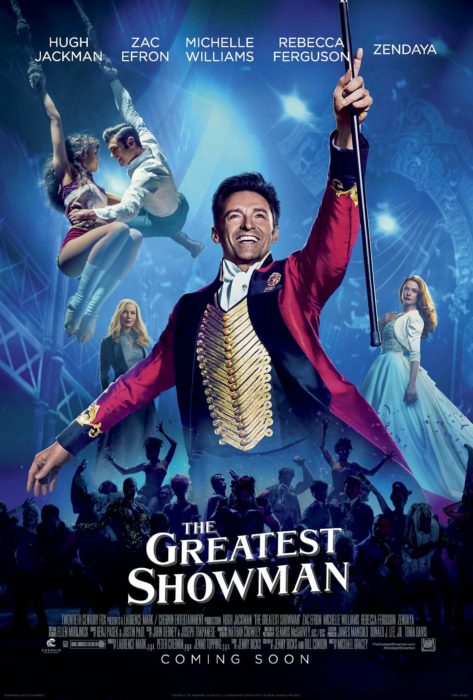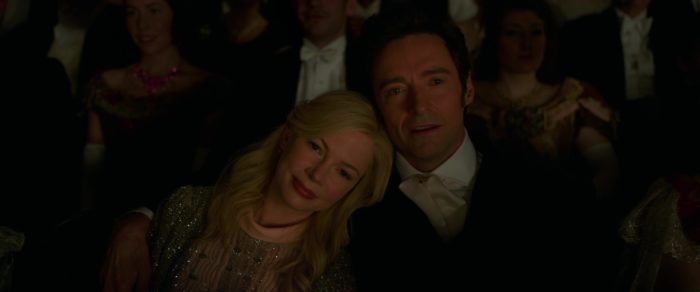Why Do Christian Fans Love ‘The Greatest Showman’?
Last week a fun little original late-2017 musical film starring Hugh Jackman, The Greatest Showman, arrived on home disc release. And Christian fantasy fans—at least represented by my many real-life and long-distance friends—went berserk with excitement.
The same thing happened last Christmas when The Greatest Showman released in theaters.
By contrast, the same types of fans, then as now, can only debate over another film that’s supposed to appeal to fantasy fans, Star Wars Episode VIII: The Last Jedi. Skipping that debate for now, my point is that The Greatest Showman seems to get far more acclaim even though it’s a wholly original story and is not, technically, in the fantasy genre.
More acclaim than a Star Wars movie? Yes, complete with joyous disc purchases (not just rentals) and multiple home viewings. What in the world is happening? So let’s explore: why do Christian fans—especially of fantastical, “geeky” stories—love The Greatest Showman?
1. The Greatest Showman has fantastical elements.
 This article won’t critic-bash. But it’s vital to note that The Greatest Showman makes several intentional, distinct genre choices that place it almost firmly in the fantasy genre.
This article won’t critic-bash. But it’s vital to note that The Greatest Showman makes several intentional, distinct genre choices that place it almost firmly in the fantasy genre.
The Greatest Showman is not a biopic or definite period piece. It’s an over-the-top musical with intentional anachronisms. These can be seen in the set and costume design—you can spy historic/modern costumes and electric-controlled background lights.1 The story also delights in anachronism, such as when Barnum (Jackman) mentions human flight tests (which in reality occurred) decades later, or when only one person says something racist, leaving most conflict to people’s fear of the circus “freaks” regardless of their ethnicity.
This means that all the critics who bemoan the story’s disregard for the real-life P. T. Barnum’s terrible actions show themselves to be plain old silly. They may as well criticize a Michael Bay movie for failing to include Scandinavian noir elements, or write seriously that “people don’t actually randomly erupt into song-and-dance numbers in real life.”
Arguably, random song-and-dance performances ground any story at the border of the fantasy camp. But The Greatest Showman is also the kind of story where your hero and heroine shared a happy childhood (of course) and your young hero gazes into a window and seems to imagine overt visions of himself as a circus ringmaster, complete with top hat. That’s basically magical realism, or historical fairy tale—so arguably, this film is fantasy.
2. The Greatest Showman offers spectacular pop songs and dances.
Disregard Let It Go from Disney’s film Frozen (2013), or even the few lyrically superior tunes from Disney’s (arguably also superior) film Moana (2016). The Greatest Showman offers a total of nine new and non-Disney songs from Benj Pasek and Justin Paul.
And each song seems genetically altered to be the most infectious earworm imaginable.
Two Christian critics called the music “overproduced.” They admitted the music is catchy, but said it doesn’t stray too far from radio pop-tune formats. I myself don’t track pop music with any enthusiasm, or at all, so the music at least strikes me as creative and original.2
Of course, the songs offer something for everyone, including but not limited to:
- The Orchestral and Fast-Paced with Hip-Hop Elements and ‘Waaahhh-Oohhhs’ that Gets Your Attention Song,
- The Follow Your Childhood Dream Truly Sweet Love Song,
- The Wake Up and Chase Down that Dream and Really Own that Sucker Song,
- The Lovely Young Female Vocalist Heart-Wrenching Song,
- The Hot Young Adult Romance Song, and (of course)
- The Vaguely Socially Progressive Self-Identity Empowerment Song3
But Christian fans don’t just like the sound or genre appeal of the song. And we don’t simply appreciate the clear dedication of director, actors, and ensemble singers and dancers in putting on a truly fun and unabashed spectacle accompanying each song. We also love the songs’ frequent themes—the same as inhabit the story itself.
3. The Greatest Showman goes new places with story and themes.
We’ve seen this film musical template: over two hours, boy has a dream, boy sings while chasing dream, boy meets and woos and sings to girl, boy has a setback, boy overcomes while singing and gets the girl and the dream and lives happily singing ever after.
The Greatest Showman does all this in the first ten to fifteen minutes. Then the story goes elsewhere and asks: what happens after boy gets girl and the dream comes true?
Without this simple yet honest thematic pursuit, The Greatest Showman wouldn’t appeal to me and other Christian fans so much. But it does, and perhaps this is a central reason Christian fans enjoy it. We resonate with this theme—even more so if we’re married and love our families. Like Barnum, we want to love and serve our families. But we also have big dreams, and many of us want to glorify God by showing these gifts—maybe even with amazing public spectacles that will, as one character suggests, “celebrate humanity.”
How, then, can we achieve both of these goals—if there is any solution at all?
Even more challenging, what happens when that big creative dream comes true, but then it’s never enough? Can our dreams become idols? Like The Greatest Showman’s Barnum, can our purer performing motives—to make people happy and support our families—share a tent with idolatrous motives, such as to crave adulation or win critical acclaim?
The Greatest Showman unabashedly4 dares us to like Barnum, but also to see how, even after he achieves his dream, he can’t live happily ever after because he can’t stop making up new dream-idols. We see in simple, fairy-tale fashion how he sacrifices his friends, family, and even his original dream to his new idol. Then the story even dares to suggest that a mass-media spectacle like popular entertainment, or the higher-culture offerings of plays or other culture that “sell virtue,” should not compete with a higher goal.
As Jackman’s Barnum sings in probably my favorite Greatest Showman song,
I drank champagne with kings and queens
The politicians praised my name
But those are someone else’s dreams
The pitfalls of the man I became
For years and years
I chased their cheers
The crazy speed of always needing more
But when I stop
And see you here
I remember who all this was for!
First, Barnum recovers his relationship with his circus performer friends, broken by his rejection of them in favor of high society. Second, singing like a man at revival having a come-to-Jesus moment, Jackman’s Barnum races away from an ongoing song-and-dance. He dashes at Wolverine speed through town, hops a train, and repents to his wife, Charity, to save his family, broken from his idolatry and an emotional (almost physical) affair.
Soon after, The Greatest Showman ends by continuing its bombastic opening number. But then the story quiets. In fact, Barnum has left the circus in the hands of his number-two man, Carlyle (Zac Efron). We’re led to believe he finally retires from circus life, and lives in peace and joy with his wife and their two daughters. See—it’s a family picture!
Now of course, anyone can turn “family” into idolatry just like any other good thing. But on any worship “spectrum,” the “family” label is at least located at the human end of the scale (as oppose to the scale’s “human creations” end, including stories and entertainment).
And in an era of unprecedented cultural redefinition of the family, it’s refreshing and even shocking to see a Major Hollywood Production go out of its way to honor the “traditional” family structure—even to the point of showing that both popular entertainment (like the circus) and high-culture (like virtue-selling plays and their fawning critics) rank second.

“From now on / From now on / Home, again …”
With that ending, The Greatest Showman stuck the landing for me.
Many of this movie’s Christian fans agree.
Bonus features: young parents can also show this story to their children, with perhaps some disclaimers about “this is a fantasy version of the real story,” realistic romance expectations, and circus performers’ attire. Also, some of us have a thing for Hugh Jackman, who despite getting butt-naked for his movies (oh … my eyes … many times) has some of our goodwill, thanks to his long marriage and role in the Christ-haunted Les Misérables.
Those are my reasons. If you liked The Greatest Showman, you may share more. Or you may just want to have a sing-a-long. Go right ahead, but trust me, my brain is already doing it.
- The only other story I know that glories in anachronistic design is Kenneth Branagh’s live-action version of the overt fairy tale Cinderella (2015). Critics didn’t like that film either. ↩
- The “overproduction” I don’t regard one way or another. I can just tell no one is auto-tuned, so I’m happy. And I’m not the sort of person who cares for minimalist coffee-shop music. ↩
- Naturally, “This is Me” is the only Greatest Showman song nominated for the Academy Award. ↩
- There’s that word again. Unabashed is a great word to describe most of The Greatest Showman. ↩





























Great article! I pre-ordered the movie as soon as I could after watching it in the theaters (and downloaded my two fave songs, “Never Enough” and “Rewrite the Stars”). The rest of my family had the pleasure of watching it with me this past weekend, as I suspect many families were gathered around their big screens doing the same thing. 😉
Your list of the songs, Stephen…! So, so nailed it. (“The Follow Your Childhood Dream Truly Sweet Love Song,” etc.)
Thanks for writing this. You put into words nearly everything that was swimming around in my head about why I like this movie. I’ll just link here next time someone asks why I recommend it.